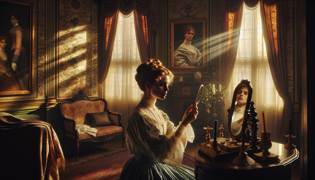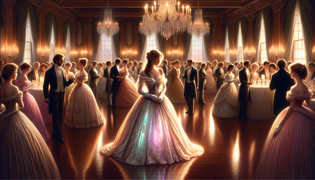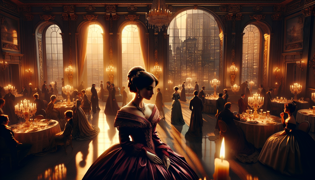Fair Charlotte: The Price of Vanity
Reading Time: 11 min

About Story: Fair Charlotte: The Price of Vanity is a Legend from united-states set in the 19th Century. This Descriptive tale explores themes of Loss and is suitable for All Ages. It offers Moral insights. A timeless American legend where beauty blinds judgment and vanity sows the seeds of downfall.
Introduction
In the heart of a peaceful 19th-century American town, the air was always tinged with a blend of hope and quiet melancholy. Early morning mists would drift lazily over cobblestone streets and neatly trimmed gardens, while the rising sun cast a gentle radiance upon a population that balanced aspiration with tradition. It was during these serene hours that whispers of an extraordinary beauty began to circulate—a beauty embodied in a young woman known simply as Charlotte. Born into affluence yet blessed with an otherworldly charm, Charlotte’s radiant countenance and delicate features quickly caught the admiring eyes of everyone around her. However, beneath her enchanting smile lay a growing fixation with appearances and a pride that bordered on the excessive.
Charlotte’s days were spent in the mirror’s embrace—a constant reminder of the grace she possessed, and a silent warning of the danger in succumbing to vanity. The refined parlors of her family’s mansion echoed with the strain of moral admonition as elders spoke softly of humility and the fleeting nature of beauty. Yet, the allure of her own reflection became a siren song that led her further from the virtues extolled by her community. As the town awoke to the promise of a new day, so too did a tragic destiny, hidden slowly behind the gentle smiles and delicate fabrics adorning both the manor and the modest homes surrounding it. The stage was set; the interplay of luminosity and shadow foretold a story that would enthrall, caution, and ultimately, leave a mark on all who dared to listen.
The Mirror's Reflection
Charlotte's early years were a study in contrasts—a blend of natural grace and an ever-deepening obsession with her own beauty. Born into a respected family known for its enduring values and philanthropic endeavors, she was a rare bloom in a well-tended garden. As a child, her eyes sparkled with curiosity and innocence. Yet even in those tender days, a subtle enchantment drew attention. Neighbors would remark on the way her laughter filled the corridors of the ancestral home, and how the garden seemed to bend closer around the rose bushes when she passed. She was like a delicate porcelain doll, carefully admired but perilously fragile.
As she grew, so too did her fascination with her reflection. Luxurious hand mirrors became both her constant companion and an unyielding judge. Day after day, in the sunlit alcoves of her family estate, she would spend hours critiquing every nuance of her appearance. The once playful glimmer in her eyes had, over time, been replaced by a steady, sometimes unyielding, glint of self-admiration. Her reflection was no longer a mere image but a cherished entity that demanded admiration and fueled ambitions that were greater than the modest dreams of those around her.
Her lavish bedroom, draped in silk and adorned with intricate tapestries, was a sanctuary for this self-worship. Bright daylight gently streamed through gauzy curtains, casting intricate patterns over her vanity, which held an array of cosmetics and delicate jewels. Yet, despite the outward evidence of wealth and refinement, a quiet melancholy pervaded her solitude. The townsfolk began to murmur in hushed tones—that the mirror was not just a reflection but a silent thief, stealing away the purity of youth and replacing it with a consuming vanity. In these whispers, the seeds of warning were sown, though none could yet predict the grim harvest that would later follow.
On many a reflective afternoon, Charlotte would gaze into that mirror, oblivious to the world outside, caught in an endless cycle of self-admiration. The contrast between the soft, inviting light that illuminated her delicate features and the encroaching shadows of her growing pride created an almost poetic tension in her life—a tension that hinted at the tragedies that lie in wait for those who become lost in the allure of their own splendor.

The Allure of Beauty
As Charlotte stepped into young adulthood, her beauty became both her calling card and her curse. The juxtaposition of her ethereal face against the rustic charm of the town rendered her a spectacle—a living painting whose every glance and gesture was applauded and dissected by the public eye. Invitations flowed like gentle streams from nearby estates and social circles, inviting her to soirées and artistic gatherings where her presence was as much a statement as the finest work of art.
Yet amidst the adoration and praise, a more dangerous allure took root. Charlotte’s pride began to insidiously transform into vanity, her self-regard growing disproportionate to the natural gifts she possessed. With every compliment, every hushed tone of admiration, she felt a swelling in her breast, as if the very light that caressed her skin was affirming her self-worth. In the eyes of many, she was not only the portrait of beauty but also the embodiment of ambition—a silent reminder that beauty, left unchecked, can lead to a dangerous path. The town’s elders, ever aware of the transient nature of physical allure, would exchange grave looks and cautionary words, recalling old proverbs about pride preceding a fall.
Every visit to the grand salons and festive gatherings reinforced this dangerous cycle. In mirrored ballrooms lit by crystal chandeliers and swirls of dancing figures, Charlotte’s image shone with an almost supernatural brilliance. Gowns of the finest silks and delicate lace, in hues of cream and pastel, accentuated her luminosity—each garment carefully chosen to elevate her striking presence. The interplay of soft candlelight and scattered daylight through high windows cast an ethereal glow on the scene, highlighting her every movement as if choreographed by fate itself.
Yet, beneath the surface of these resplendent moments, the lines between admiration and envy blurred. Whispers of discontent began to ripple through the glittering circles. Friends turned to silent critics as they noted the way Charlotte dismissed sincere compliments, only to seek new illusions of adoration. Among these murmurs was the eerie suggestion that her beauty, for all its wonder, was a double-edged sword—a gift destined to lead to sorrow. Even as she reveled in the limelight, an undercurrent of foreboding accompanied each sparkling smile, hinting that the price of vanity might one day become unbearably steep.

The Fateful Ball
The turning point in Charlotte’s tale arrived on an autumn evening when the town’s most illustrious benefactor hosted a grand ball. The stunning manor, with its soaring arches and opulent interiors, was transformed into a shimmering gallery of art and high society. As dusk fell, the manor’s expansive windows glowed with a soft luminescence, and the grounds were adorned with strings of lanterns that danced with flickering light in the cool night air.
Charlotte, dressed in a gown of deep maroon silk trimmed with delicate lace, entered the ball as if she were a living embodiment of grace and ambition. Her presence alone seemed to command the room, drawing eyes and hushed whispers alike. Each step she took echoed the confidence of one who believed she was destined for greatness. The sumptuous setting, with its gilded moldings and polished marble floors, was a perfect mirror to the inner world of lavish self-admiration that had come to define her life.
At the height of the evening, as music from a finely tuned orchestra filled the air with a haunting melody, Charlotte found herself at the center of many admiring glances. However, amid the sparkling conversation and clinking glasses, a stranger appeared—a man draped in the mystery of melancholy and quiet intensity. His eyes, dark and deep, seemed to peer beyond her beautiful exterior. In a brief, yet charged conversation away from the prying eyes of the assembly, he cautioned her, in a voice as soft as falling ash, about the perils of mistaking beauty for worth. His words, though few, carried the weight of a prophecy, and for a moment, the flickering candlelight in the hall mirrored the flicker of doubt in Charlotte’s eyes.
The festive mood, nevertheless, carried on unabated. The stranger’s warning was quickly lost amidst the cavalcade of compliments and orchestrated dances. Yet, as the evening waned, a subtle shift in Charlotte’s demeanor became apparent—a growing fissure between her celebrated exterior and an inner torment provoked by his somber counsel. In that charged moment, beneath the shimmering lights and orchestrated gaiety, the seeds of tragedy were sown. The orphaned warning echoed in the recesses of her mind, a quiet harbinger of the price that vanity would ultimately demand.

Shattered Illusions
In the weeks that followed that fateful night, Charlotte found herself wrestling with an internal disquiet that no amount of external beauty could dispel. The luxurious salons and effusive praise that once fortified her vanity now rang hollow in the echo of the mysterious stranger’s words. Her daily reflections in the ornate mirror took on a new, sorrowful quality—a constant reminder not only of her radiant beauty but also of the fragility of the façade she had built around herself.
The town, once enchanted by her presence, began to view her with mixed emotions. The same streets and gardens that had witnessed her luminous arrival now carried whispers of caution. Friends who had once shared in her joy now silently recoiled from the chill in her demeanor. In the soft morning light, as dew clung to the petals of the blooming flowers, Charlotte’s eyes revealed the depth of her inner loneliness—a loneliness that no amount of praise could console.
As autumn yielded to a colder winter, the inevitable truth became clear. In her relentless pursuit of adoration and recognition, Charlotte had placed her self-worth solely in the adulation of others. The insidious nature of vanity had led her to neglect the quiet wisdom of humility and self-awareness. One bitter, frost-laden morning, as she stood before her gilded mirror, the weight of her self-inflicted isolation became unbearable. In a moment that seemed to suspend time, driven by despair and the haunting echo of unheeded counsel, Charlotte took a tragic step toward an irreversible end.
In the days that followed her untimely demise, the town was united in a shared sorrow and a deep, reflective silence. The grand manor’s corridors, once alive with the sound of laughter and conversation, became spaces of mourning and quiet introspection. The tragic fall of Fair Charlotte served as a timeless reminder—a cautionary parable where an obsession with external beauty and the inability to heed gentle warnings culminated in the shattering of a priceless soul. Her legacy, marred by the consequences of vanity, urged future generations to seek balance between external allure and inner virtue, lest history repeat itself.

Conclusion
The tragic journey of Fair Charlotte became an enduring parable woven into the fabric of the community’s collective memory. In the wake of her untimely demise, the town reevaluated its values and the perilous cost of unchecked vanity and self-absorption. The legacy that Charlotte left behind was not merely one of luminous beauty lost too soon, but also a profound lesson in humility and the impermanence of external allure. Neighbors gathered to recount her story, drawing parallels between her radiant beginnings and the sorrowful downfall that ensued from an overindulgence in admiration. The mirror that once served as her constant companion was eventually removed from view, symbolizing a collective renunciation of the vanity that had ensnared her soul.
In the quiet moments of reflection that followed the tragedy, many found solace in the newfound wisdom gleaned from Charlotte’s life. Parents warned their children that true worth lay not in fleeting appearances but in the strength of character and compassion. The mansion, once a stage for a selfish pursuit of beauty, became a somber reminder of the costs of pride. Over time, the story of Fair Charlotte evolved into a cherished morality tale—a call to embrace inner virtues over superficial allure. The legacy of loss gradually transformed into one of enduring inspiration, urging every generation to seek balance, humility, and a deeper connection with the truths that bind us all.
Thus, the once bright flame of vanity was replaced by a steady light of wisdom—a beacon for all who learned that beauty must always be tempered by the grace of humility. The memory of Fair Charlotte continued to whisper through the corridors of time, reminding all that the allure of self-admiration, if left unchecked, holds the power to transform even the brightest star into a cautionary tale of sorrow.

















